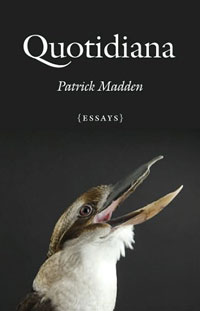The World's Whisper

In Brigham Young creative writing professorPatrick Madden’s new collection of essays Quotidiana (U of Nebraska Press), we are immediately disabused of equating the ordinary and commonplace with the trivial by the two epigrams that welcome the reader to this bounteous volume of erudition and rumination.
Montaigne observes, “From the most ordinary and commonplace things, if we could put them in their proper light, can be formed the greatest miracles of nature and the most wondrous examples.” Which Virginia Woolf echoes in her essay on Montaigne, “The most common actions—a walk, a talk, solitude in one’s own orchard—can be enhanced and lit up by the association of the mind.” There is a third epigram, from Jose Saramago’s “Essay on Blindness,”that has its own charm, “Consider the circumvolutions of the human mind, where no short or direct route exists.”
Patrick Madden elaborates in his meta-essay, “The Infinite Suggestiveness of Common Things”:
The essay is an open leisurely form, somewhat allergic to adventure, certainly opposed to sensationalism. Even Montaigne, when he encounters a “monstrous child,” a traveling freak show exploited by his uncle for profit, turns his thoughts to a subversion of common notions of “natural,” with barely a mention of the exotic scene he’s witnessed. During my first extended encounters with the essay, I was struck (dumbstruck, moonstruck) by those authors who wrote from seemingly insignificant, overlooked, transient things, experiences and ideas, who were able to find within their everyday unexceptional lives inspirations for essaying.
The good professor concludes with this preemptory and appealing justification:
Despite appearances to the contrary, despite the clamor and clang of true-life sensationalism in every medium, quotidian essays are being written and published all the time. They’re an antidote to the harried hullabaloo of—what?—talk shows? tabloids? the madding crowd? And so I (and my friends, known and unknown) continue this quite labor, stopping to smell the roses. Suspicious that the tree falling in the forest does make a sound. The cat in the box might as well be alive. The exercise of writing from the infinite suggestiveness of common things has proved fruitful to me time and again, with essays sparked by considerations of garlic, diaper changing, washing grapes, a chipped tooth, and others (also as in the case of this book, laughter, hepatitis, singing, finity). I am addicted to the world’s whisper.
In addition to the 11 charming and elegant essays collected in this volume, Patrick Madden (and known friends) have created a wonderful web site, Quotidiana, which is an online compendium of 381 public domain essays including writers from Joseph Addison and Francis Bacon to Mary Wollencraft and Zitkala-Ša.
Of course I couldn’t help myself, browsing through the site’s offerings (when I should have been completing this notice)—here’s Christopher Morley from his “On Visiting Bookshops”:
The lack of intelligence with which people use bookshops is, one supposes, no more flagrant than the lack of intelligence with which we use all the rest of the machinery of civilization. In this age, and particularly in this city, we haven’t time to be intelligent.
Let me suggest that one would do well to bookend Patrick Madden’s charming and liberating endeavor with John D’Agata’s excellent and exhaustive anthologies, The Next American Essay and The Lost Origins of the Essay (Graywolf). For the lover of the commonplace or the profound, this is a troika of some wondrous whispering about the world.
